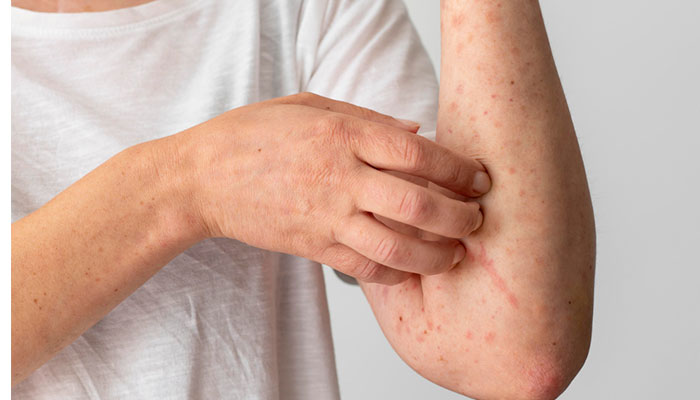Introduction
Urticaria, also referred to as chronic hives, is a skin condition characterized by itchy bumps. Chronic hives typically last for more than six weeks and can reappear over months or years. In many cases, the source of chronic hives is unclear.
Signs and Symptoms of Urticaria
- Red, purple, or skin-coloured bumps
- Itchiness
- Painful swelling around the cheeks, lips, or eyes
Causes of Urticaria
- Heat or cold exposure
- Sunlight
- Vibration
- Pressure on the skin
- Environmental triggers
- Medical conditions
Understanding Urticaria in Ayurveda
In Ayurveda, urticaria, known as “Sheetapitta,” is primarily attributed to imbalances in the body’s doshas, particularly Pitta and Vata. It can be caused due to excessive heat and toxins (Ama) in the body, leading to skin eruptions and itching. Consumption of heat-inducing foods, exposure to extreme temperatures, and emotional stress are believed to trigger urticaria.
Treatment and Management
Urticaria treatment involves antihistamines to relieve itching and inflammation. Identifying and avoiding triggers, such as allergens or stressors, is essential. In severe cases, corticosteroids may be prescribed.
Care offered by SGP’s PSA has been demonstrated to be effective in alleviating symptoms and enhancing the quality of life for patients with urticaria. The primary focus of care delivered by the PSA is to manage symptoms, address emotional and psychological distress, and improve overall comfort.
FAQs about Urticaria
-
No, urticaria (hives) is not contagious. It is a skin condition triggered by various factors and cannot be transmitted from one person to another through direct contact or exposure.
-
Acute urticaria is characterized by a complete resolution of the rash within six weeks (in the majority of cases, the rash resolves within 24 to 48 hours). On the other hand, in chronic urticaria, rash persists or appears intermittently for an extended period, often for several years.
-
Yes, urticaria can affect children. Children can experience hives (urticaria) due to various triggers such as allergens, infections, or physical factors. Paediatric urticaria may require specialized care and management.
-
Stress can exacerbate urticaria symptoms. Emotional stressors can trigger the release of chemicals that provoke or worsen hives, emphasizing the connection between psychological stress and skin conditions like urticaria.
-
Untreated urticaria can lead to complications, including severe itching, sleep disturbances, and a reduced quality of life due to persistent discomfort. It can also cause emotional distress, especially when chronic, affecting overall well-being. It is important to get treated for urticaria.






